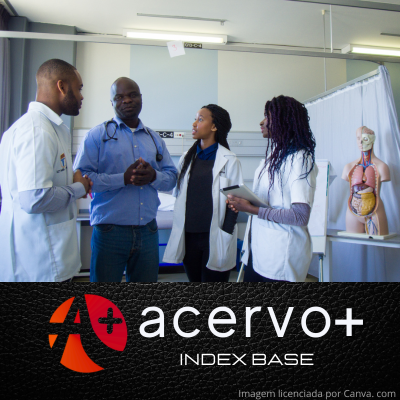Percepção discente sobre a utilização da dramatização como estratégia educacional em habilidades clínicas
##plugins.themes.bootstrap3.article.main##
Resumo
Objetivo: Avaliar a percepção de estudantes de medicina acerca da utilização de uma estratégia de dramatização no ensino-aprendizagem da anamnese. Métodos: Trata-se de um estudo descritivo, de caráter exploratório, conduzido em um curso de graduação em Medicina no ano de 2024, com 87 estudantes do quarto semestre. Os alunos receberam instrução teórica sobre a técnica da entrevista médica e posteriormente foram organizados em grupos para realizar uma anamnese com um paciente-ator. A prática foi supervisionada por professores e o feedback foi imediato. Aplicou-se um questionário com o objetivo de avaliar a percepção dos estudantes sobre a utilização da ferramenta. O estudo foi aprovado por Comitê de Ética em Pesquisa Resultados: Observou-se alto grau de satisfação com a ferramenta, com a maioria dos alunos considerando-a muito efetiva no aprendizado, com aumento significativo na confiança na aplicação prática, contribuindo para melhora da sua performance. A aplicabilidade da ferramenta em outras unidades curriculares foi fortemente apoiada; o feedback em grupo foi bastante valorizado. Houve percepção de um ambiente seguro de aprendizado e influência positiva sobre o raciocínio clínico. Conclusão: A percepção dos estudantes foi positiva, sugerindo a dramatização ser uma opção viável e eficaz no ensino e prática da anamnese.
##plugins.themes.bootstrap3.article.details##
Copyright © | Todos os direitos reservados.
A revista detém os direitos autorais exclusivos de publicação deste artigo nos termos da lei 9610/98.
Reprodução parcial
É livre o uso de partes do texto, figuras e questionário do artigo, sendo obrigatória a citação dos autores e revista.
Reprodução total
É expressamente proibida, devendo ser autorizada pela revista.
Referências
2. BAKER J, et al.Teamwork in healthcare: promoting effective teamwork in Healthcare in Canada. Healthcare Quarterly, 2017.
3. BENNET D, GIBBONS C.Investigating the impact of e-learning technologies on the satisfaction and engagement of medical students. BMC MEDICAL EDUCATION, 2016; 16 (1):76.
4. BLAND JM, ALTMAN DG. "Statistics notes: Cronbach's alpha”. British Medical Journal, 1997; 314(7080), 572.
5. BOND A, et al. The role of simulation in medical education and the development of clinical skills. Clinical Simulation in Nursing, 2020; 41, 62-71.
6. DAVIS MH, et al. Simulation-Based Medical Education: A Review.Journal of the American College of Surgeons,2019;228(4): 438-450.
7. EDMONDSON AC. Psychological safety and learning behavior in work teams.Administrative Science Quarterly, 1999; 44 (2): 350-383.
8. ENGELHORN CA. O uso do roleplay no ensino da técnica de anamnese e de habilidades de comunicação para estudantes de medicina. Revista Brasileira de Educação Médica, 2019; 43 (3):178-183.
9. ERICSSON KA. Deliberate Practice and the Development of Expert Performance: An Overview. Academic Emergency Medicine, 2008;15(11): 988-994.
10. GREEN M, et al. The Impact of Active Learning on Medical Students' Learning Outcomes. BMC Medical Education, 2020.
11. HEGARTY J, et al. The importance of communication skills in the development of empathy in medical students.Journal of Medical Ethics, 2016; 42 (6): 392-396.
12. HILL AE, et al. A review of standardized patients in clinical education: implications for speech-language pathology programs. International Journal of Speech-Language Pathology, 2010;12(3):259-70.
13. HUANG G, et al.Medical students' confidence in their clinical skills: a systematic review. MedicalEducation, 2021; 55 (1):87-99.
14. ISSENBERG SB, et al. Features of the effective simulation-based learning environment. Medical Education, 2019; 53(10), 1044-1054.
15. KATZ J, et al. Active learning in medical education. Medical Teacher,2020; 42(3):271-276.
16. KINSELLA EA. Professional knowledge and the development of clinical reasoning: implications for nursing education. Nursing Education Perspectives, 2010; 31(5): 303-307.
17. KNEEBONE R. Simulation in surgical training: educational issues and practical implications. Medical Education, 2005; 39(10): 1051-1056.
18. LEVINSON W, et al. The Physician-Patient Relationship. The Journal of Medicine and Philosophy, 2010; 35 (2): 107-127.
19. MASON SJ, et al. Teaching communication skills to medical students: A randomized controlled study using live actors. BMC Medical Education, 2013; 13:1-9.
20. MEYER G, et al. Simulation in medical education: A systematic review. Education for Health,2016; 29 (1): 1-8.
21. MILLER GE.The assessment of clinical skills/competences/performance. Academic Medicine, 1990. 65 (9): 63-67.
22. MILLER GE, ARCHER J. Impact of high-stakes examinations on medical education. Medical Education, 2010; 44 (1): 85-96.
23. NESTEL D, TIERNEY T. Roleplay for medical students learning about communication: guidelines for maximizing benefits. BMC Medical Education, 2011;11 (1).
24. SOARES MOM, et al. Reflexões contemporâneas sobre anamnese na visão do estudante de medicina. Revista Brasileira de Educação Médica, 2014;38 (3): 314-322.
25. SWANWICK T, MORGAN P. Educating the future doctor: A perspective from medical education. Medical Teacher, 2010; 32 (9): 721-728.
26. WELLER JM, et al. Simulation in clinical teaching and learning. Medical Journal of Australia, 2012; 196 (9):1-4.
27. WINSTONE NE, et al. Supporting learners’ engagement with feedback: A systematic review. Educational Psychology Review, 2018; 30, (3):441-469.

